AmeriGas executive uses her diagnosis to improve lives of others
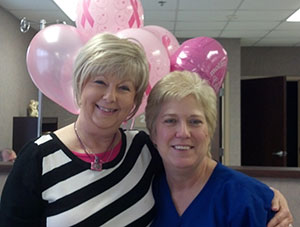
With her cancer treatments complete, Jane Stroupe, left, says she feels like “a free woman.” Photo courtesy of Jane Stroupe and Nancy Coop
Jane Stroupe has had the kind of career that hardly seems possible anymore: Rising from a part-time clerk job at Piedmont Natural Gas with almost no knowledge of propane, almost 40 years later she now is an area director for the country’s largest propane company.
Three things about that career path are particularly extraordinary: First, thanks to a payroll error, she was promoted from part-time clerk to full time two weeks into the job; second, in 1997 she made history as the first woman president of her company; and third, she has never left that company in four decades, although its ownership and name have changed over the years through a series of acquisitions.
Today, Stroupe, 60, serves as area director for AmeriGas district offices in parts of South Carolina, North Carolina, Tennessee and Georgia. That leadership experience proved valuable last year when she helped organize a support group for women who, like her, are coping with a cancer diagnosis. The group helps women who are struggling to make sense of their new reality.
“Someone is always there that has just been diagnosed, and they are scared to death,” Stroupe says. “We help them cope by answering their questions and listening to their concerns. They are encouraged they will be healthy, ‘fairly normal’ women like we are very soon. It is a great feeling to provide support to each other and give a new friend a hug to let them know they can make it through the process.”
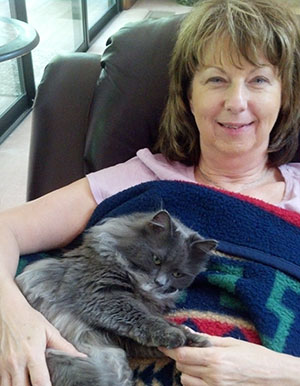
Jane Stroupe says her coworkers at AmeriGas and throughout the propane industry proved to be tremendously supportive.
Health scare
Stroupe, an only child, was grieving the sudden death of her mother in March 2013 when a routine annual mammogram that June showed an abnormality.
She distinctly recalls the feeling of fear that swept through her when she and her husband, Mark, heard she “definitely” had breast cancer.
“It was as if our world stood still,” she says. “All the information we were being given was overwhelming, and we learned medical terminology we never wanted to hear.”
She underwent a bilateral mastectomy in mid-July, and the aggravations that accompany serious health concerns began: She started chemotherapy on her ninth wedding anniversary. A port-a-catheter inserted the previous day apparently punctured a lung, causing it to collapse and sending her back to the hospital for four days. Her hair fell out 16 days after her first treatment, triggering denial and eventually acceptance to the point that she embraced the variety of wigs and hats available.
“I bought beautiful wigs and hats and changed my look every day to suit my mood,” Stroupe says. “Some days I was a blonde, some days I was a redhead. Some days I wore a hat with hair sewn in.”
Having learned about resources available to women through the American Cancer Society and other organizations, Stroupe decided to take action on what previously only had been in the “good idea” stage: forming a support group for women in her county with cancer.
“I want to help other women to deal with it,” she says. “We can be such a huge source of support and encouragement for each other.”
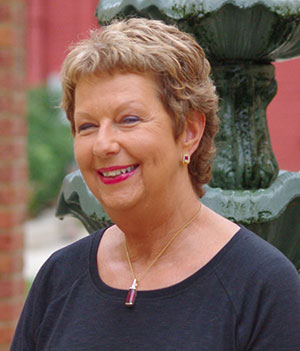
Jane Stroupe’s experiences with breast cancer motivated her to form a support group for women in her county with the disease.
Stroupe secured donations from local merchants, got financial donations from sponsors to pay for refreshments, and advertised in the newspaper. The first big kickoff meeting, in December 2013, was held in the hospital’s hallway for lack of another meeting space.
But soon, support for the group grew. Just nine months later, the group has received numerous donations of space and door prizes. For example, a local hair and skin care center hosted the most recent meeting, donating makeovers to all of the women. A local department store is planning a big fashion show, where proceeds will benefit the support group, which numbers about 50.
“Everyone in the community has just jumped on board,” she says. “The community has really put their arms around this group.”
Not everyone is ready to start discussing their diagnoses, Stroupe acknowledges. Many times they will sit and listen.
“Some people like to talk about it and it helps them; others are more private and don’t want to share their details with the ladies,” she says.
She has learned to celebrate the little victories, like getting the drainage tubes removed, getting stitches out, not being nauseated for a day, being able to sit up all day, and keeping her clothes on all day because her incisions healed.
“Then, you go on with your life as quickly as possible and face each day head-on,” Stroupe says. “You try to look your best, so you will feel your best.”
Industry support
Through it all, Stroupe says, her coworkers at AmeriGas and throughout the propane industry proved to be tremendously supportive.
Cards, gifts, meals, flowers, soft pajamas, refrigerator magnets and more were all appreciated and touching.
“One of my favorite gifts is miniature pink boxing gloves,” she says. “They hang on my refrigerator to remind me I can win the battle. My boss sent me a pink bracelet that says ‘Be Brave.’ One of my employees bought everyone pink cancer bracelets that say ‘No One Fights Alone.’ A vendor bought employees Susan G. Komen bracelets that say ‘Be the Cure.’ Employees, friends and family wore these bracelets until I finished my treatment in July.”
In fact, the North Carolina Propane Gas Association magazine used a picture on its front cover of a group of members showing off their bracelets.
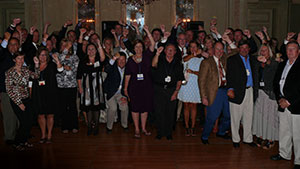
Members of the North Carolina Propane Gas Association show off bracelets dedicated to the fight against cancer.
With her treatments complete, Stroupe says she feels like “a free woman” and only revisits the oncologist every six months for blood tests and follow-up.
She tells others facing a cancer diagnosis that they must accept the news in their own way.
“Don’t let anyone tell you how you should feel,” she says. “Cry, scream, throw things, have a pity party, be mad, be sad – then realize it is not a life sentence. You can survive. You can lead a full life, although you may have a new ‘normal.’ Nothing stays the same, so try to embrace the hand you are dealt. You can’t change it, but God will help you through the tough times.
“Strength comes in ways and through people you never thought about,” she continues. “Be brave, even if at times you don’t feel so brave. Hold your head high and jump back into your life with more determination than ever.”
Stroupe urges women to get annual mammograms.
“It takes very little time to do, is not painful and most insurance companies pay 100 percent for this exam,” she says. “Early detection could save your life.”
Along the way, she’s learned that some things that once bothered her aren’t so important anymore.
“Cancer has changed my life in a positive way,” Stroupe says.
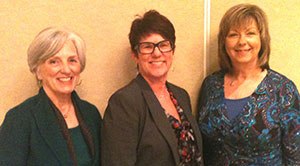
NPGA Women in Propane Council leaders during a 2012 meeting: from left, Nancy Coop, Jill Hopkins and Jane Stroupe.
She doesn’t care if the house isn’t spotless or if the laundry is done only once a week, or if dinner consists of tomato sandwiches. Time with her husband, a manager with Duke Energy-Oconee Nuclear Station, is precious. She’s always believed in treating people the way she would want to be treated, but the cancer diagnosis brought that sentiment into laser focus. She and her husband support a local homeless shelter and food bank to help others get back on their feet after hard times.
“God has blessed me in so many ways through my illness,” Stroupe says. “I try to ‘pay it forward’ every opportunity I get. I want to make someone else’s life easier without them even knowing who the gift came from.”
North Coast Media, the parent company of LP Gas magazine, is donating a portion of October issue revenues to the American Cancer Society. The national organization is dedicated to saving lives from cancer, focusing on research, education, advocacy and service. Learn more at cancer.org.
Photos: AmeriGas

















Nice Article Jane !!
We are so proud of you !!!